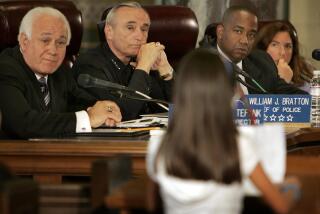Poles Shake Up Police Unit in Priest’s Death
- Share via
WARSAW — A government spokesman confirmed Tuesday that a major shake-up is under way in the section of the secret police involved in the murder of a Roman Catholic priest.
The spokesman, Jerzy Urban, said the reorganization involves the Fourth Department of the Polish Interior Ministry, the department that has been responsible for surveillance of Catholic church activities.
” . . . Department IV has been divided into two different departments and there are new directors now,” Urban said at his weekly news conference.
General Still Suspended
He said that Gen. Zenon Platek, head of the department at the time three of its members kidnaped and killed Father Jerzy Popieluszko last Oct. 19, is still suspended from all duties and that “a personnel review” is continuing within the Interior Ministry.
Urban said that Col. Leszek Wolski of the Warsaw regional office of the Polish secret police also remains under suspension.
Platek and Wolski both testified at the trial of four secret police officers convicted last week in Popieluszko’s murder. The fourth officer was a colonel convicted of aiding and abetting the crime.
Premier Wojciech Jaruzelski told a meeting of the Communist Party Central Committee last December that an extensive personnel review was being conducted within the ministry and that it would continue for some time. Jaruzelski also assumed personal control of security matters within the Politburo.
There were unconfirmed reports Tuesday, mainly from government sources speaking privately, indicating that at least 100 secret police officers have been replaced since the Popieluszko murder. Urban, speaking at his weekly news conference, repeated an earlier assertion that there would be no detailed explanation of the Interior Ministry shake-up.
Jaruzelski apparently saw the killing of the priest as a major breach in discipline. In the course of the trial of the officers, there was testimony indicating that the defendants had either acted on their own or on orders given outside the chain of command.
Urban also denied that the authorities are directing a propaganda campaign against the Roman Catholic Church.
He charged that some priests are making inflammatory speeches against the state and ticked off examples of what he described as anti-government sermons. He cited four priests by name and warned that some anti-government statements are being studied to determine whether they violated the law.
The government’s minister for religious affairs, Adam Lopatka, has warned that the government will not hesitate to arrest priests whose rhetoric is regarded as being in violation of the law. He said that about 300 priests have spoken out frequently against the government and that about 10% of these are hard-core dissidents.
“Political polemic is one thing, but recognition that a statement is a violation of the law is another,” Urban said.
He carefully avoided making any personal criticism of Poland’s Catholic primate, Cardinal Jozef Glemp. And he noted that less than 1% of the country’s 21,000 priests are involved in anti-government activities. He emphasized that it continues to be government policy to cooperate with the church.
Urban’s statements, made from prepared notes, appeared to be the latest salvo in an increasingly public war of words between the two most powerful institutions in Poland.
The verbal attacks began last month when the prosecutor in the murder trial of the four secret police officers suddenly lashed out at dissident priests and the church itself for creating what he called a climate of hatred.
Speculation on Pressure
Western and Polish observers alike speculate that the government’s attack on the church is the result of pressure exerted by the governments of neighboring Communist countries, including the Soviet Union, or by hard-liners within Poland’s Communist party.
On Monday, Cardinal Glemp called his first-ever press conference with Warsaw-based Western correspondents to answer the government charges. The government activity is expected to be further criticized at a meeting of the church episcopate later this week.
Urban said that Col. Adam Pietruszka and Capt. Grzegorz Piotrowski, secret police officers sentenced to the maximum possible prison terms of 25 years in the Popieluszko murder case, have already taken the initial steps required to appeal their sentences to the Supreme Court.
The other two officers, Lts. Leszek Pekala and Waldemar Chmielewski, who were sentenced to 15 and 14 years, respectively, still have time to appeal the verdict, he said. The appeals are expected to take months.
More to Read
Sign up for Essential California
The most important California stories and recommendations in your inbox every morning.
You may occasionally receive promotional content from the Los Angeles Times.













